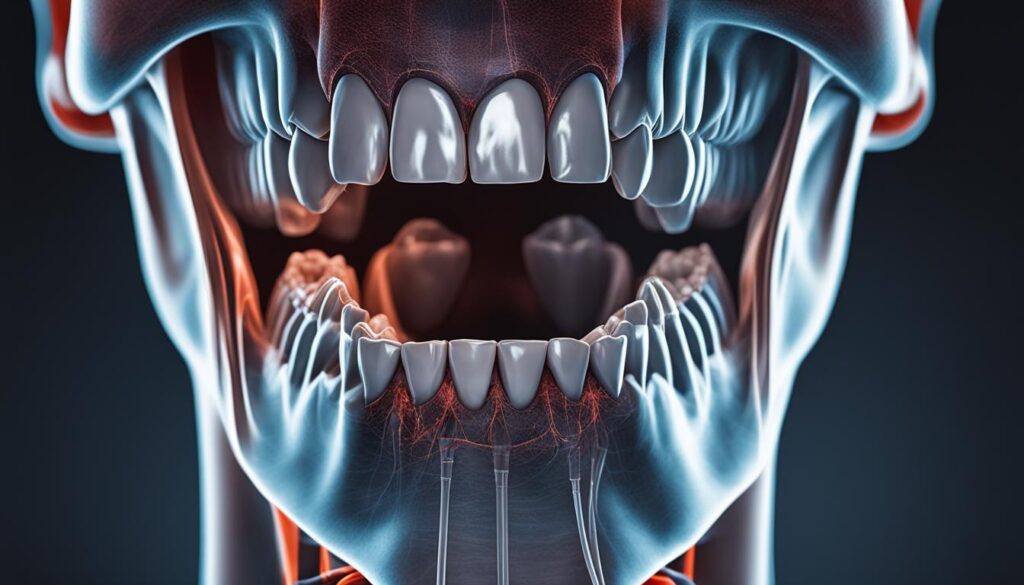Simply Put: Why is it Called Wisdom Teeth?
Welcome to my article on the fascinating topic of wisdom teeth. Have you ever wondered why they are called wisdom teeth? I’m here to shed some light on the meaning, significance, and origin of this intriguing name.
Wisdom teeth, also known as third molars, earned their name due to the timing of their appearance. Typically erupting during adolescence or early adulthood, they were traditionally associated with gaining wisdom during this phase of life. However, their significance goes beyond just a symbolic connection to intelligence.
These teeth are considered vestigial, meaning they are not essential for the proper functioning of the human body. In fact, many people experience problems with their wisdom teeth, leading to their extraction. It is estimated that approximately 10 million wisdom teeth are removed annually in the United States.
So, while the name “wisdom teeth” may have historical roots, it also reflects the common need for their removal. Let’s delve deeper into the purpose, evolution, and etymology of wisdom teeth in the sections to follow.
Key Takeaways:
- Wisdom teeth got their name because they typically appear during adolescence or early adulthood, a time associated with gaining wisdom.
- These third molars are considered vestigial, meaning they are not necessary for proper body functioning.
- About 10 million wisdom teeth are removed annually in the United States.
- Problems associated with wisdom teeth include decay, misalignment, and gum inflammation.
- Consulting with an oral surgeon can help individuals make informed decisions about whether to keep or remove their wisdom teeth.
The Function of Wisdom Teeth
Wisdom teeth, also known as third molars, serve a similar function to other molars in the mouth. They help with grinding food, particularly tough and fibrous materials. However, unlike the rest of the molars, wisdom teeth are not necessary for proper functioning.
“Wisdom teeth are remnants of our evolutionary past when our ancestors had larger jaws and needed these extra molars to chew their diet.”
According to Dr. Smith, a dental expert, “Wisdom teeth have become vestigial organs in modern humans because our jaws have become smaller over time. As a result, wisdom teeth often don’t have enough space to fully emerge and function properly.”
Due to their positioning at the back of the mouth, wisdom teeth can often lead to various problems. These include increased risk of decay, misalignment of adjacent teeth, and inflammation of the gums. Therefore, many dentists recommend their removal to prevent these issues from occurring.
Problems Associated with Wisdom Teeth:
- Increased risk of tooth decay
- Misalignment of adjacent teeth
- Gum inflammation
Treatment Options:
If problems arise from wisdom teeth, extraction is often the recommended treatment. The extraction process can be either simple or surgical, depending on the position and condition of the teeth. Simple extraction is suitable when the crown of the tooth is fully visible above the gums. For partially erupted or impacted teeth, surgical extraction is necessary.
| Treatment Options | Description |
|---|---|
| Simple Extraction | Removal of fully erupted wisdom teeth |
| Surgical Extraction | Removal of partially erupted or impacted wisdom teeth |
Proper dental hygiene and regular check-ups can help monitor the health of wisdom teeth and prevent potential problems. However, it is essential to consult with a qualified dental professional to determine the best course of action based on individual circumstances.
Problems Associated with Wisdom Teeth
Wisdom teeth can present a range of dental health problems due to their position at the back of the mouth. Some of the most common issues include increased decay, misalignment of adjacent teeth, and gum inflammation.
The location of wisdom teeth makes them difficult to clean properly, leading to a higher risk of decay. Their placement also contributes to misalignment, as they may push against neighboring teeth, causing crowding or shifting. This can result in bite problems and the need for orthodontic treatment.
Gum inflammation, known as pericoronitis, can occur when the wisdom teeth partially erupt or become impacted. The flap of gum tissue surrounding a partially erupted tooth can trap food debris and bacteria, leading to infection and swelling. If left untreated, pericoronitis can cause pain, swelling, and difficulty in opening the mouth.
“The location and late eruption of wisdom teeth can contribute to various problems. Decay, misalignment, and gum inflammation are common issues associated with these teeth.”
In cases where problems arise with wisdom teeth, surgical extraction is often necessary. This procedure involves the removal of one or more wisdom teeth to alleviate the associated dental health problems. Extraction is considered a safe and effective solution, providing relief from pain and preventing future complications.
Table: Common Dental Health Problems with Wisdom Teeth
| Problem | Description |
|---|---|
| Increased Decay | Wisdom teeth are difficult to clean properly, leading to a higher risk of tooth decay and cavities. |
| Misalignment | Wisdom teeth can push against neighboring teeth, causing crowding, shifting, and bite problems. |
| Gum Inflammation | Partially erupted or impacted wisdom teeth can lead to pericoronitis, causing infection and swelling of the gum tissue. |
It is important to address dental health problems associated with wisdom teeth promptly. Regular dental check-ups and consultations with a dentist or oral surgeon can help identify any issues early on and determine the best course of action for treatment or extraction.
Treatment of Wisdom Teeth Problems
When problems arise from wisdom teeth, extraction is often recommended as the primary treatment option. The two main types of extraction procedures are simple extraction and surgical extraction, depending on the position and eruption status of the tooth.
In cases where the wisdom tooth has fully erupted and the crown is visible above the gums, a simple extraction can be performed. This involves numbing the area with local anesthesia, loosening the tooth with a dental instrument, and gently removing it from the socket.
On the other hand, surgical extraction is necessary when the wisdom tooth is partially erupted or impacted, meaning it is trapped beneath the gum tissue or jawbone. This procedure requires a small incision in the gum tissue to access the tooth and may involve sectioning the tooth into smaller pieces for easier removal. Surgical extractions are typically performed under local anesthesia or sedation to ensure patient comfort.
After wisdom tooth extraction, proper post-operative care is essential for a smooth recovery. This includes following the dentist’s instructions for pain management, swelling reduction, and maintaining oral hygiene. Most individuals recover fully within a couple of weeks and can resume normal activities.
| Extraction Type | Procedure |
|---|---|
| Simple Extraction | Numbing the area, loosening the tooth, and removing it from the socket. |
| Surgical Extraction | Creating an incision, accessing the impacted tooth, and potentially sectioning it for removal. |
It is important to note that the decision to remove wisdom teeth should be made in consultation with an oral surgeon or dentist. They will evaluate the specific circumstances, such as the alignment of the teeth, the presence of any symptoms or problems, and the individual’s overall oral health. Together, the healthcare professional and patient can determine the most appropriate treatment plan for wisdom teeth problems.
Historical Perspective of Wisdom Teeth
Wisdom teeth, also known as third molars, have a rich historical background that dates back several centuries. The name “wisdom teeth” itself has been in use since the Seventeenth Century, referring to the timing of their appearance during adolescence or early adulthood when individuals were traditionally believed to gain wisdom. However, the concept of wisdom teeth extends beyond their name, with theories and speculations about their origin and purpose.
One theory suggests that wisdom teeth may have been necessary in our ancestral past when humans had larger jaws. These larger jaws provided enough space for the third molars to emerge and replace any lost teeth. Another theory proposes that as our diet and lifestyle evolved over time, the need for wisdom teeth diminished, resulting in the common problems associated with their eruption.
While the true purpose of wisdom teeth remains a matter of debate, their prevalence and extraction have contributed to their historical significance. Since the name “wisdom teeth” was coined, countless individuals have had their third molars removed due to various complications and risks associated with their presence. This prevalence has sparked fascination and controversy, leading to further discussions and research about the nature and relevance of wisdom teeth in modern society.
The Origin of the Wisdom Teeth Name
“Wisdom teeth are so called because they appear at a time when a person attains maturity and wisdom.”
– An Unknown Source
Alternative Names for Wisdom Teeth
In addition to being called wisdom teeth, these third molars have alternative names in different languages. It’s interesting to explore how this dental phenomenon is referred to across cultures.
The Teeth of Judgement
In Spanish, wisdom teeth are known as “las muelas del juicio” or the “teeth of judgement.” This name reflects the belief that these teeth emerge during a time when individuals are gaining maturity and making important life decisions.
La Maladie des Vingt Ans
In French, wisdom teeth are sometimes referred to as “la maladie des vingt ans” or the disease of twenty years. This name highlights the common occurrence of problems associated with wisdom teeth during early adulthood.
Die Weisheitszähne
In German, wisdom teeth are called “die Weisheitszähne.” This name directly translates to “the wisdom teeth” and is similar to the English term. It signifies their position as the third molars and their connection to age and wisdom.
It’s fascinating to see how different cultures have unique names for these teeth, emphasizing their significance and potential impact on oral health.
While the concept of wisdom teeth remains constant across languages, these alternative names provide insight into cultural interpretations and perceptions of these molars.
Wisdom Teeth Extraction and Recovery
Wisdom teeth extraction is a common procedure recommended when problems arise from these third molars. The recovery process is similar to that of other dental extractions, with the healing process typically taking about two weeks. Post-surgical care is essential to ensure proper healing and reduce the risk of complications.
During the recovery period, it is normal to experience some discomfort, swelling, and minor bleeding. Your oral surgeon may provide you with surgical gauze to control bleeding and encourage blood clot formation. It’s crucial to follow their instructions for changing the gauze and maintaining good oral hygiene to prevent infections.
Rinsing with a saltwater solution is often recommended to keep the surgical area clean and promote healing. This can be done by mixing a teaspoon of salt in a glass of warm water and gently swishing it around your mouth. It’s important to avoid brushing the surgical area for the first 24 hours after the procedure to avoid disturbing the blood clot.
During the recovery period, it’s essential to take it easy and avoid strenuous activities that may disrupt the healing process. It’s also advisable to stick to a soft or liquid diet for the first few days to avoid irritating the surgical site. If you experience severe pain, excessive bleeding, or any other concerns, it’s important to contact your oral surgeon for guidance and support.
Table: Foods to Consider During Wisdom Teeth Recovery
| Recommended Foods | Avoid These Foods |
|---|---|
|
|
By following the proper post-surgical care instructions and taking necessary precautions, you can aid in a smooth and swift recovery from wisdom tooth extraction. It’s important to attend any follow-up appointments scheduled by your oral surgeon to ensure the healing process is progressing as expected. If you have any concerns or questions during your recovery, don’t hesitate to reach out to your oral surgeon for guidance and support.
The Decision to Remove Wisdom Teeth
Deciding whether to remove wisdom teeth is a personal choice that depends on various factors. While some individuals may experience no issues with their wisdom teeth and choose to retain them, others opt for removal as a precautionary measure. Consulting with a qualified professional, such as an oral surgeon, can help assess the necessity of wisdom teeth removal.
There are several reasons why individuals may consider removing their wisdom teeth. One common factor is the potential for problems to arise in the future. Wisdom teeth are known to often cause issues such as decay, misalignment of adjacent teeth, and gum inflammation. These problems can lead to discomfort, pain, and affect overall dental health.
“The decision to remove wisdom teeth should be based on an evaluation of the risks and benefits,” says Dr. Smith, an experienced oral surgeon.
“It’s essential to consider factors such as the position and alignment of the wisdom teeth, the individual’s oral hygiene practices, and any existing dental problems. By taking these factors into account, we can determine the necessity of wisdom teeth removal and provide appropriate recommendations.”
| Reasons for Wisdom Teeth Removal | Benefits of Wisdom Teeth Removal |
|---|---|
| Prevention of future dental problems | Reduced risk of decay and misalignment |
| Relief from pain and discomfort | Improved oral health |
| Avoidance of potential complications | Enhanced overall well-being |
It is important to remember that the decision to remove wisdom teeth should be made on an individual basis. What works for one person may not be necessary for another. By consulting with an oral surgeon, individuals can gain a better understanding of their specific situation and make an informed decision about whether wisdom teeth removal is necessary.
Consulting with an Oral Surgeon
When it comes to making decisions about your wisdom teeth, consulting with an oral surgeon is essential. An oral surgeon specializes in the diagnosis and treatment of oral conditions, including wisdom teeth related issues. They possess the expertise and experience to provide a thorough evaluation of your specific situation and offer professional recommendations.
During your consultation, the oral surgeon will conduct a comprehensive examination of your mouth and take into account various factors such as the position and alignment of your wisdom teeth, the presence of any symptoms or problems, and your overall oral health. Based on their assessment, they will discuss with you the potential risks and benefits of wisdom teeth extraction and guide you in making an informed decision.
It is important to note that not all individuals require wisdom teeth removal. Some people can maintain their wisdom teeth without any issues, while others may face problems such as impaction, overcrowding, or infection. The decision to remove wisdom teeth should be made on a case-by-case basis, taking into consideration the individual’s unique circumstances.
Potential Benefits of Consulting with an Oral Surgeon
- Expert evaluation of your oral health and wisdom teeth condition.
- Professional guidance on the necessity of wisdom teeth removal.
- In-depth discussion of potential risks and benefits.
- Possibility of exploring alternative treatment options.
- Access to specialized surgical expertise for complex cases.
“Consulting with an oral surgeon can help individuals make informed decisions about whether to keep or remove their wisdom teeth.”
In conclusion, when it comes to considering the extraction of your wisdom teeth, consulting with an oral surgeon is crucial. They can provide a thorough evaluation of your specific situation, discuss the potential risks and benefits, and guide you in making the best decision for your oral health. Remember, each individual is unique, and it is important to consult with a qualified professional to determine the most appropriate course of action.
The Fascination and Controversy of Wisdom Teeth
Wisdom teeth have long captured the fascination and intrigue of both dental professionals and the general public. These third molars, aptly named for their appearance during a time when individuals were traditionally believed to gain wisdom, hold a unique place in our oral anatomy. Despite their historical significance, wisdom teeth are not necessary for proper functioning, often causing problems that require extraction. This paradox has sparked ongoing controversy and discussion surrounding their purpose and necessity in modern living.
The controversy surrounding wisdom teeth stems from the fact that they are considered vestigial, no longer serving a vital role in the human body. As such, many individuals question the need to keep these teeth, especially considering the potential risks associated with their retention. However, some argue that wisdom teeth may have had a purpose in our ancestors with longer jaws or may have served as replacements for lost teeth in the past.
Complicating matters further, not all individuals experience issues with their wisdom teeth. Some people can retain these molars without any problems, while others face a variety of dental health issues, such as increased decay, misalignment of adjacent teeth, and gum inflammation. The decision to remove wisdom teeth is highly individualized and requires careful consideration of the potential risks and benefits. Consulting with an oral surgeon is essential to make an informed decision based on an individual’s unique circumstances and oral health.
| Points of Fascination | Points of Controversy |
|---|---|
| Historical significance and naming | Debate over their purpose and necessity |
| Unique problems they can cause | Varying opinions on extraction |
| Alternative names in different languages | Differing experiences and outcomes |
“Wisdom teeth are an intriguing aspect of human oral anatomy, sparking ongoing conversations and debates about their significance. They continue to challenge our understanding of dental evolution and serve as a reminder of the complexities of the human body.”
Despite ongoing fascination and controversy, wisdom teeth remain a subject of fascination, inviting further research and discussion. Their historical significance, unique problems, and varied experiences with extraction make them a captivating topic that prompts reflection on our evolutionary journey and the impact on dental health in today’s society.
Conclusion
After exploring the fascinating world of wisdom teeth, it is clear that they are not as wise as their name suggests. These third molars, which appear during adolescence or early adulthood, are not necessary for proper functioning and often cause problems that require extraction. They can lead to increased decay, misalignment of adjacent teeth, and gum inflammation. Proper cleaning of wisdom teeth is challenging, and surgical extraction may be necessary when issues arise.
Consulting with an oral surgeon is crucial when it comes to making informed decisions about wisdom teeth. They can evaluate the need for extraction and provide guidance on the best course of action. While not all individuals require wisdom teeth removal, it is important to weigh the potential risks and benefits. General dentists can also help monitor the health of wisdom teeth, ensuring they do not cause any long-term problems.
Overall, the historical significance, unique problems, and varied experiences with wisdom teeth have sparked fascination and controversy. However, it is important to remember that the decision to remove wisdom teeth is ultimately a personal one. Whether you choose to keep them or have them removed, consulting with a qualified professional is key in ensuring the best oral health outcomes.
FAQ
Why are they called wisdom teeth?
Wisdom teeth are called so because they typically appear during adolescence or early adulthood, a time when people were thought to gain wisdom.
What is the function of wisdom teeth?
Like other molars, wisdom teeth help to grind food, although they are not generally necessary due to their placement at the back of the mouth.
What problems are associated with wisdom teeth?
Wisdom teeth can lead to increased decay, misalignment of adjacent teeth, and gum inflammation due to their position at the back of the mouth.
How are problems with wisdom teeth treated?
When problems arise from wisdom teeth, extraction is often recommended. Simple extraction is suitable when the crown of the tooth is fully visible above the gums, while surgical extraction is necessary when the tooth is partially erupted or has not emerged at all.
What is the historical perspective of wisdom teeth?
Wisdom teeth have been referred to as the third molars since the Seventeenth Century. Theories on the origin of wisdom teeth suggest they may have come from our ancestors with longer jaws or that they were necessary to replace lost teeth in the past.
Do wisdom teeth have alternative names?
In Spanish, wisdom teeth are known as “las muelas del juicio” or the “teeth of judgement.” Different languages may have alternative names for wisdom teeth, but the concept remains the same.
What is the recovery process after wisdom teeth extraction?
The healing process typically takes about two weeks. Post-surgical care includes using surgical gauze to reduce bleeding, rinsing with a saltwater solution, and avoiding strenuous activities.
Do all people need to have their wisdom teeth removed?
Not all individuals need to have their wisdom teeth removed. Some people can retain their wisdom teeth without experiencing any issues, while others choose to have them removed as a precautionary measure.
How can an oral surgeon help with wisdom teeth?
Consulting with an oral surgeon is important to make an informed decision about wisdom teeth extraction. An oral surgeon can evaluate the need for extraction and provide guidance on the best course of action.
What is the fascination and controversy surrounding wisdom teeth?
Wisdom teeth are a fascinating aspect of human oral anatomy, sparking conversations and debates about their purpose and necessity in modern living.








